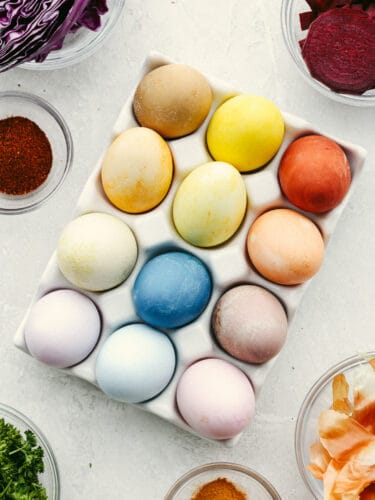
These naturally dyed Easter eggs are such a fun activity for the family! It’s amazing to see what colors you can create with basic vegetables and spices!
Only 10 more days until Easter! You’ve got to capitalize on the festive desserts and treats while you can! Bunny cupcakes, Easter egg sugar cookies, and Easter cake are all as cute as they are delicious!
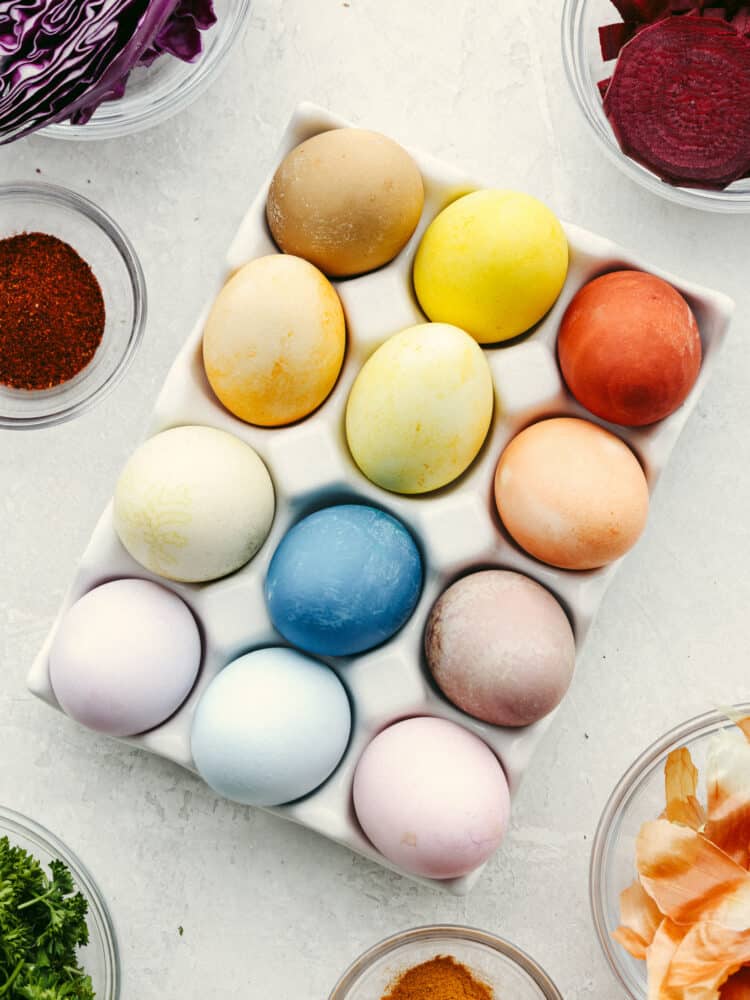
Easter Eggs Dyed With Natural Ingredients
Making Easter eggs with natural ingredients is a science experiment your kids are going to want on repeat! (Find more fun, family-friendly recipes here!) It requires a little extra prep work, but the process is so fun! My kids loved watching basic veggies turn into dye with just a little water and vinegar! You can achieve both vibrant and pastel colors with this lineup.
The best part is, a lot of these ingredients were just hanging out in my pantry and fridge! This method is great if you’re wanting that perfect color, but the boxed dye just isn’t cutting it. You can throw some dye together in a pinch! This really is a great activity and produces the most beautiful results. Let’s get started!
All Ingredients Needed
This is what I used to dye my eggs, and the results turned out beautifully! We got both bold and vibrant colors as well as delicate pastels! You can experiment with other bright vegetables and spices, too, to see what dye they create! All measurements can be found in the recipe card below.
- Hard-Boiled Eggs: The canvas for your beautiful creations. I’ve got a quick and easy method to make them here!
- Water: Creates the liquid base for your dye.
- White Vinegar: Vinegar is what helps the colors actually bond to the outside of your eggs!
- Skin from Yellow Onions: Produces a deep orange dye.
- Turmeric: For the most vibrant yellow!
- Red Cabbage: Creates purples and blues!
- Beet: For pink and red tones.
- Chili Powder: Makes a brown dye.
- Fresh Parsley: Creates a pastel greenish-yellow.
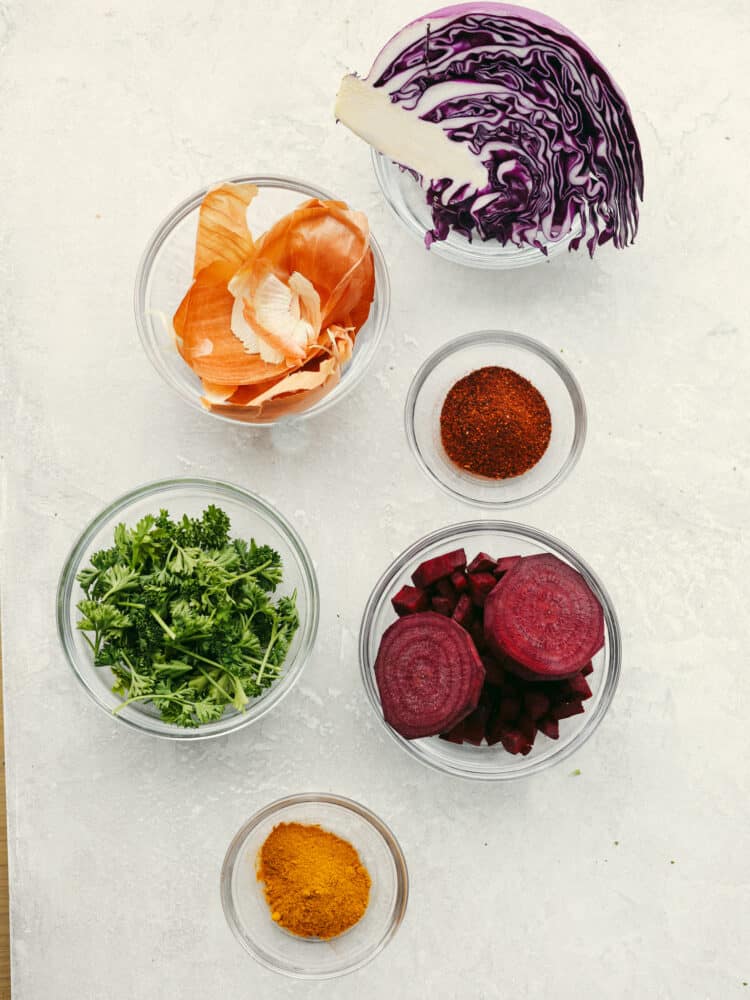
How to Make Natural Easter Egg Dye
Not only is it fun to make natural dyes, but they’re a healthy choice, too! They’re free of harsh chemicals but look just as lovely! Note: these dyes will stain. Wear an apron or clothes you don’t care about!
- Boil Water, Add Dye Ingredient: Boil 2 cups of water. Once at a roiling boil, add the dye ingredient of choice.
- Simmer: Simmer over low heat for 25-30 minutes.
- Strain Into Jars: Strain the liquid into pint jars and let cool completely.
- Add Vinegar, Soak Eggs: Once the liquid is cooled, add 2 tablespoons of white vinegar to each dye and add your boiled eggs. Let them soak in the dye for 20 minutes, longer if you would like a deeper color. Some dyes will color the egg faster than others. You may check their progress as you go and remove them when the desired shade has been achieved.
- Dry: Blot the eggs with a paper towel or clean dish towel. Allow the eggs to air dry the rest of the way before storing.
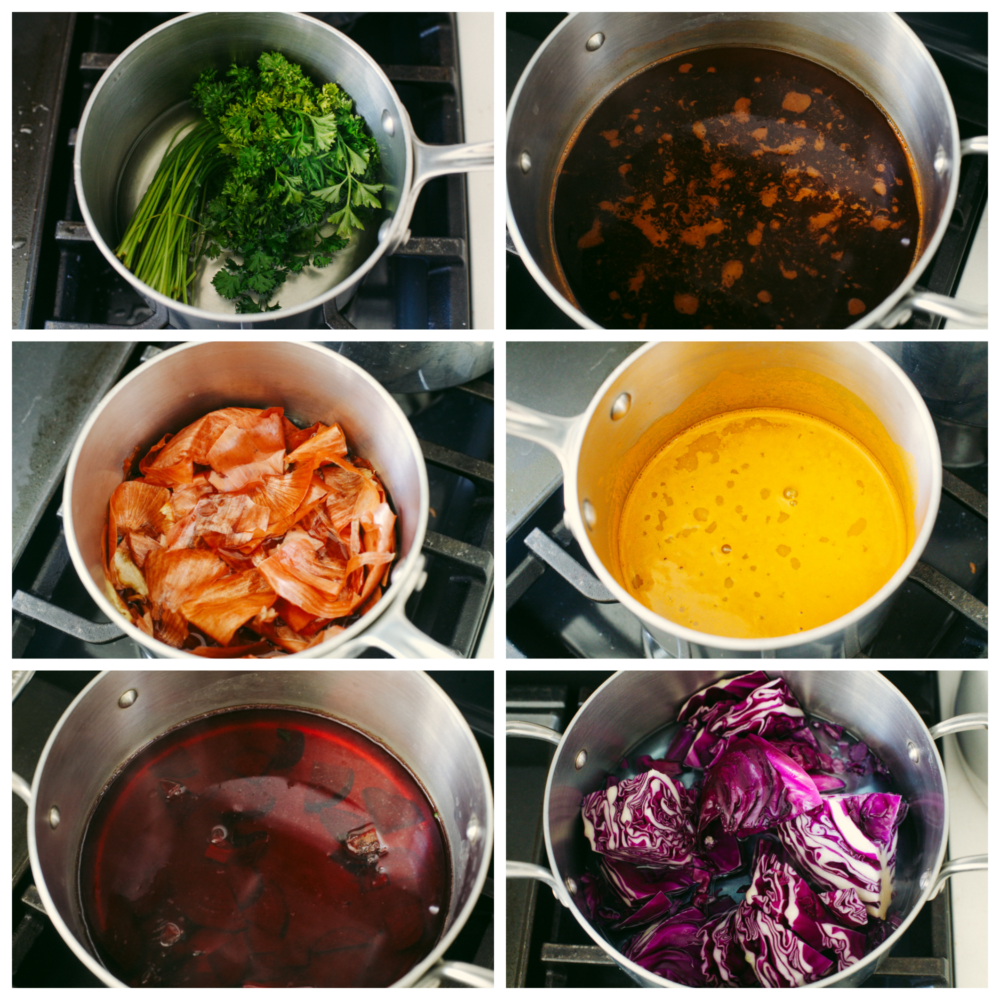
Tips and Tricks for Dyeing Eggs
Here are a few tips on designing your eggs and crafting the perfect shade! It’s so much fun to take your egg out of the dye and see what color it turned into!
- Making Designs: To make designs, use a white crayon to draw patterns on the hard-boiled eggs before adding them to the dye.
- Dye Time: The longer you leave your eggs in the dye, the more vibrant they will be. At 30 minutes, my eggs were more on the pastel side. Leaving them in the dye overnight produced the brightest results.
- Layering and Mixing Colors: Experiment by dipping eggs in more than one dye to achieve layered colors and new shades!
- Purple: Dye first in cabbage, then beets.
- Green: Dye first in turmeric, then cabbage.
- Gray: Dye first in chili powder, then cabbage.
- Using Brown Eggs: Brown eggs can be used, but you’ll end up with a slightly different and darker color than if you use white eggs.
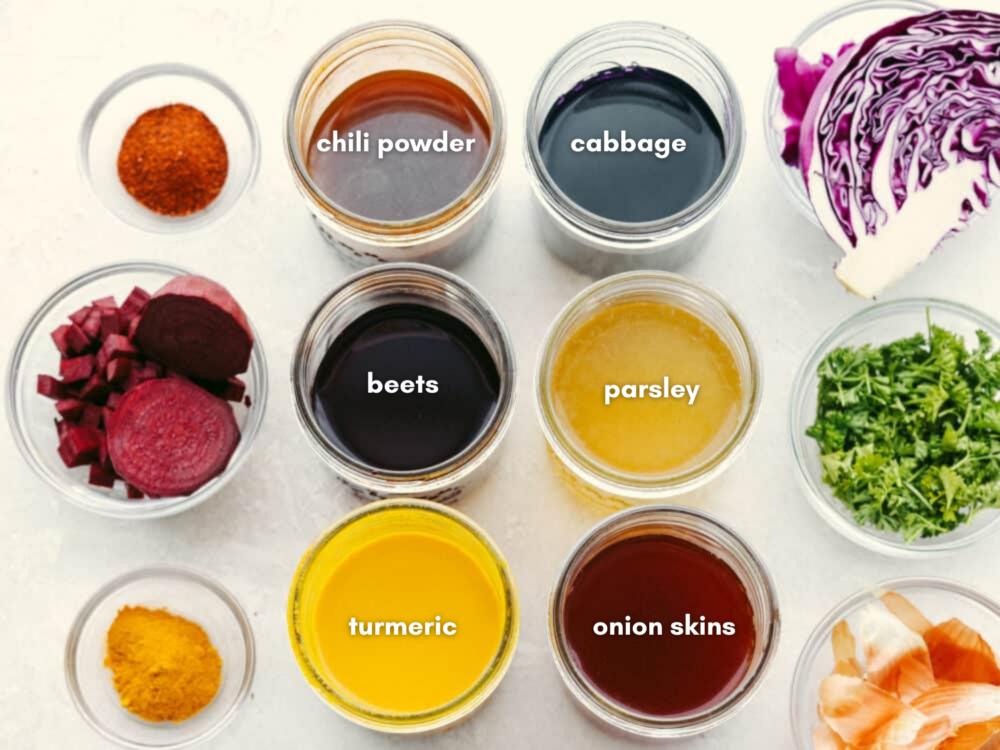
Storing Dyes / Dyed Eggs
Now that you’ve got your dyes made, here’s how to store them for later!
- Storing Dyes: Keep the prepared dyes in the refrigerator until ready to use. They will keep in the fridge for up to 7 days.
- Storing Dyed Eggs: Store dyed eggs in the fridge for up to 7 days. Be aware that the color may fade or rub or peel off over time.
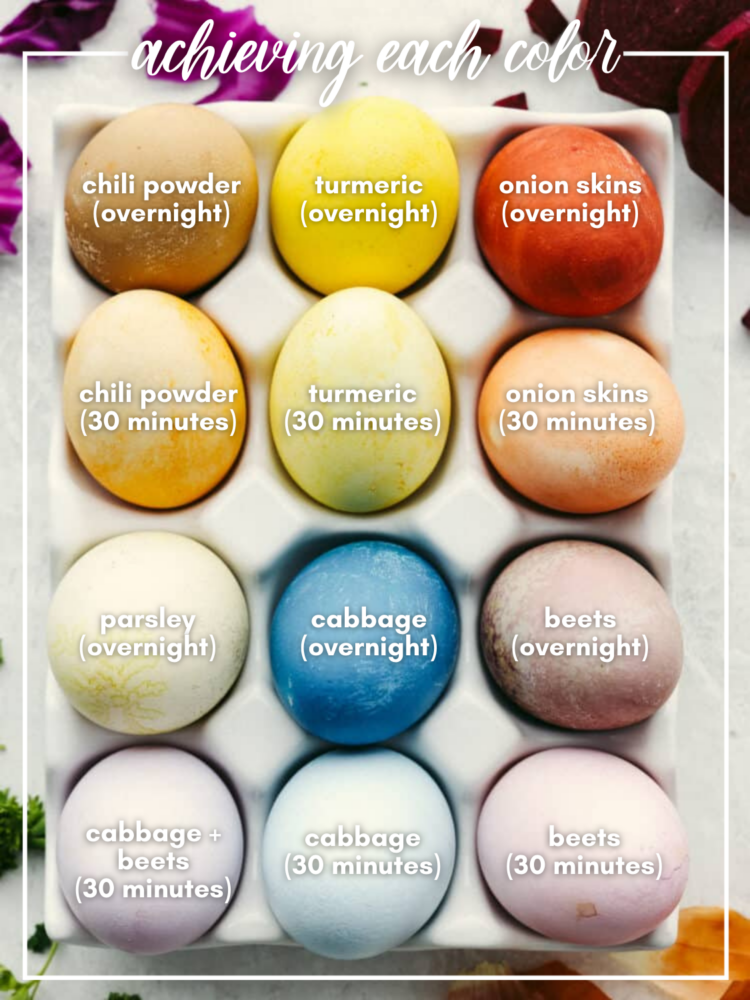
More Easter Recipes
Easter is the time for hearty dinners and tasty treats. These are a few more of my favorite Easter recipes, just in time to throw into your dinner lineup! They are always a crowd-pleaser wherever they go! I know your family will love them as much as mine does! Need more inspiration? Find my master list of Easter recipes here.
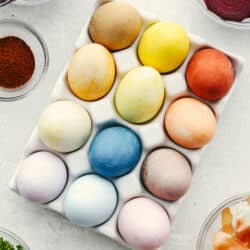
Natural Easter Egg Dye
Ingredients
- Hard Boiled Eggs
- 2 Cups Water per dye color
- 2 Tablespoons White Vinegar per dye color
- Skin from 4 Yellow Onions
- 2 Tablespoons Turmeric
- ½ Head Red Cabbage
- 1 Beet chopped or shredded
- 2 Tablespoons Chili Powder
- 1 Bunch Fresh Parsley
Instructions
-
Boil 2 cups of water. Once at a roiling boil, add the dye ingredient of choice.
-
Simmer over low heat for 25-30 minutes.
-
Strain the liquid into pint jars and let cool completely.
-
Once the liquid is cooled, add 2 tablespoons of white vinegar to each dye and add your boiled eggs. Let them soak in the dye for 20 minutes, longer if you would like a deeper color. Some dyes will color the egg faster than others. You may check their progress as you go and remove them when the desired shade has been achieved.
-
Blot the eggs with a paper towel or clean dish towel. Allow the eggs to air dry the rest of the way before storing.

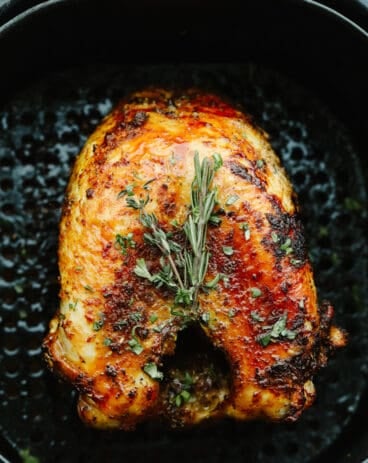

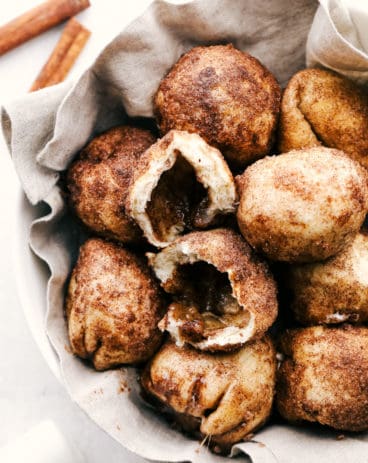
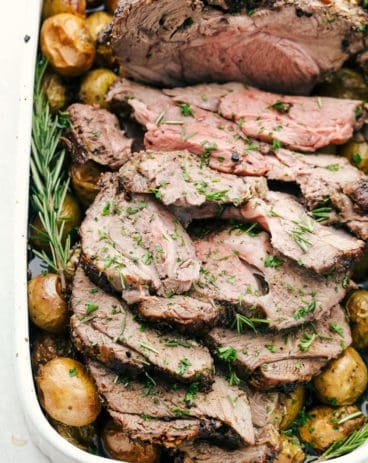
0 comments